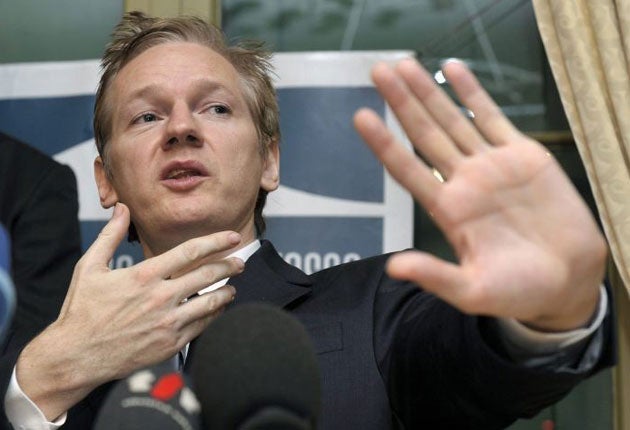The fugitive - Assange needs new safe haven
Interpol adds to calls for arrest of Wikileaks ringmaster thought to be hiding in London

Your support helps us to tell the story
From reproductive rights to climate change to Big Tech, The Independent is on the ground when the story is developing. Whether it's investigating the financials of Elon Musk's pro-Trump PAC or producing our latest documentary, 'The A Word', which shines a light on the American women fighting for reproductive rights, we know how important it is to parse out the facts from the messaging.
At such a critical moment in US history, we need reporters on the ground. Your donation allows us to keep sending journalists to speak to both sides of the story.
The Independent is trusted by Americans across the entire political spectrum. And unlike many other quality news outlets, we choose not to lock Americans out of our reporting and analysis with paywalls. We believe quality journalism should be available to everyone, paid for by those who can afford it.
Your support makes all the difference.Interpol has issued a wanted notice for WikiLeaks founder Julian Assange, heightening the Australian's status as a virtual refugee. The "Red Notice", circulated to the International Criminal Police Organisation's 188 members, concerns the warrant issued by police in Sweden in connection with a sex crime investigation in Sweden, and instructs anyone with any information to "contact local or national police".
It is not an international arrest warrant – Interpol do not have such authority – but it makes the world an even smaller place for Assange, whose list of enemies began with Kenya's former president Daniel arap Moi, executives at Swiss and Icelandic banks, Scientologists, British National Party members and, not least, Sarah Palin.
But then WikiLeaks went to war with Washington, and the list of enemies grew dramatically. In the space of six months, Assange has gone from being a little-known Australian former hacker-turned-transparency campaigner to one of the world's most recognisable and divisive figures.
Such notoriety has come at a heavy personal price. America's determination to see WikiLeaks closed down and its founder arrested have made 39-year-old Assange into a virtual refugee, reliant on the kindness of supporters to house him, rarely able to spend more than a few nights in any one place and rapidly running out of safe havens. Australia, his home country, has launched a criminal investigation to see if he has broken any local laws, while US prosecutors are preparing their own charges under the Espionage Act.
"I'm confident that the Justice Department is figuring out how to prosecute him," Jeffrey Smith, a former CIA general counsel, told The Washington Post. Whether a foreign national could be charged and brought to trial under America's espionage laws is up for debate.
In Sweden, where many of WikiLeaks' servers are based, prosecutors have issued an arrest warrant for Assange for rape charges and Stockholm's immigration authorities have rejected his application for residency. He insists the rape accusations are fabricated and part of a smear campaign and he accuses the Swedish authorities of caving in to US pressure to crack down on his organisation.
For the past three months, Assange has largely based himself in Britain, but he avoids hotels, eschews credit cards that can be traced, and is rarely contactable by mobile phone. He has even dyed his bright white hair brown to make it harder for potential foes to track him in the street. Yet his days in the UK are likely to be numbered. His visa is believed to expire early next year, and if the US pursues a prosecution, he may soon find himself being flown across the Atlantic to face a jury. In Assange's case, any extradition would also require the consent of Australia, but it seems likely its government would comply.
One potential sanctuary for him might be with the leftist governments of Latin America. Yesterday, Ecuador extended a welcoming hand to Assange, saying they would give him asylum "without any kind of trouble and without any kind of conditions". Venezuela's Hugo Chavez has also publicly delighted in the recent leaks from the State Department.
Wherever Assange does decide to set up base, one thing is certain – the leaks will keep coming. For the past month, WikiLeaks' administrators have had to suspend the submissions wing of the website because they have been overwhelmed by the number of fresh whistle-blowers sending them information. Anyone who thinks the WikiLeaks founder will take a back seat over the coming months and wait for the heat to die down must be mistaken. Those who know the 6ft 2in Australian describe him as a single-minded, obsessive and determined man who revels in his outlaw image. A deeply committed "freedom of information fundamentalist", he is above all motivated by a firm belief that all information should be in the public domain. But his personal politics is also heavily influenced by a strong antipathy towards America and corrupt corporate culture.
Join our commenting forum
Join thought-provoking conversations, follow other Independent readers and see their replies
Comments